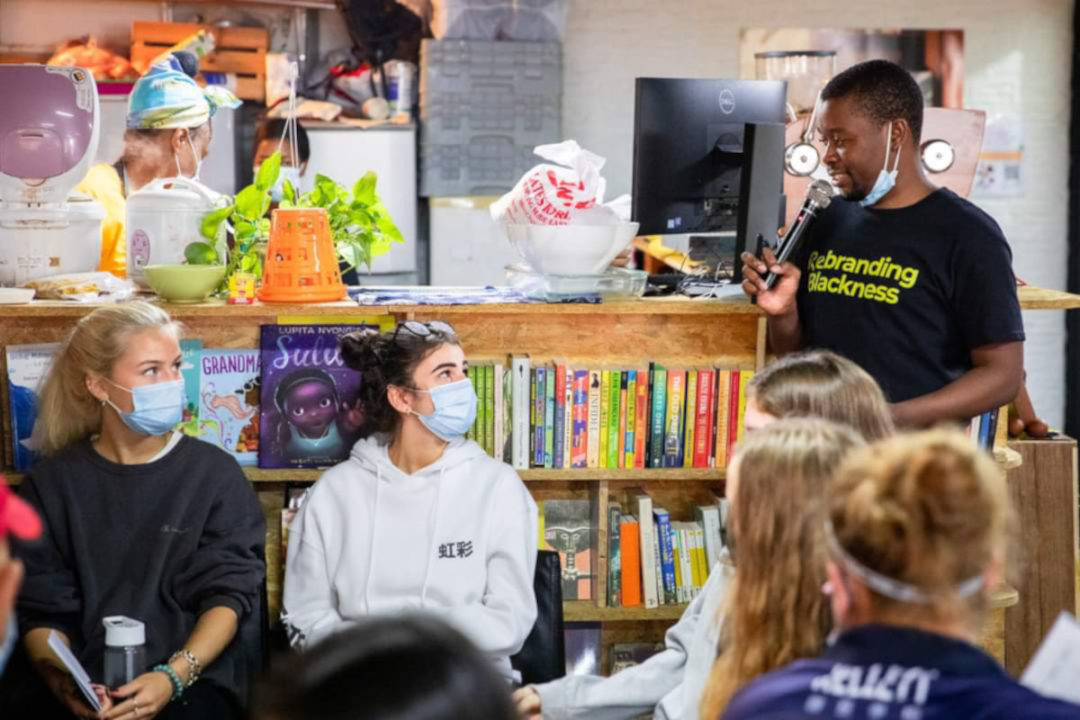In honour of Africa Month, we chatted with the Founder of Africa Center Hong Kong, Innocent Mutanga. Innocent fled his home country of Zimbabwe in 2013 under threat of political kidnapping, arriving in Hong Kong as a refugee. He faced homelessness and inability to work or study because of his asylum seeker status. So he visited libraries, consuming everything he could about Hong Kong’s history and society.
Innocent’s refusal to accept ‘no’ as an ultimatum culminated in him becoming the first asylum seeker in Hong Kong to graduate from a local university and going on to work at a leading investment bank. Through his barrier-breaking, he’s opening the doors for other minority groups trying to gain a foothold in an environment failing to provide support for upward mobility.
With the Africa Center’s often free cultural events and outreach programs for schools and businesses, Innocent is hoping that the African perspective doesn’t get left out in the emerging era. The goal is to make the world, starting with Asia, a better place for everyone with a shared history of oppression.
#1 – Africa Center’s motto is Rebranding Blackness. What does ‘blackness’ mean to you?
Associations with Africanness is largely what people mean when they talk about blackness. That is, people of African descent and also people in African diaspora, like Jamaicans, African Americans, Afro-Brazilians.
[Blackness] is not just skin colour … it’s more about the historical aspect.
But when you are in Asia, blackness goes beyond people from the African diaspora or African descent. There are black people who are indigenous to Fiji, Papua New Guinea, the Papua region of Indonesia, who are blacker than Africans, sometimes.
It’s not just skin color, to be more accurate. It’s more about the historical aspect, a shared history of some form of oppression. Struggling due to forces like colonialism, slavery, a lot of people have encountered that. So there’s that sharedness with anybody we’d consider black, in a sense.
#2 – What sparked you to start Africa Center?
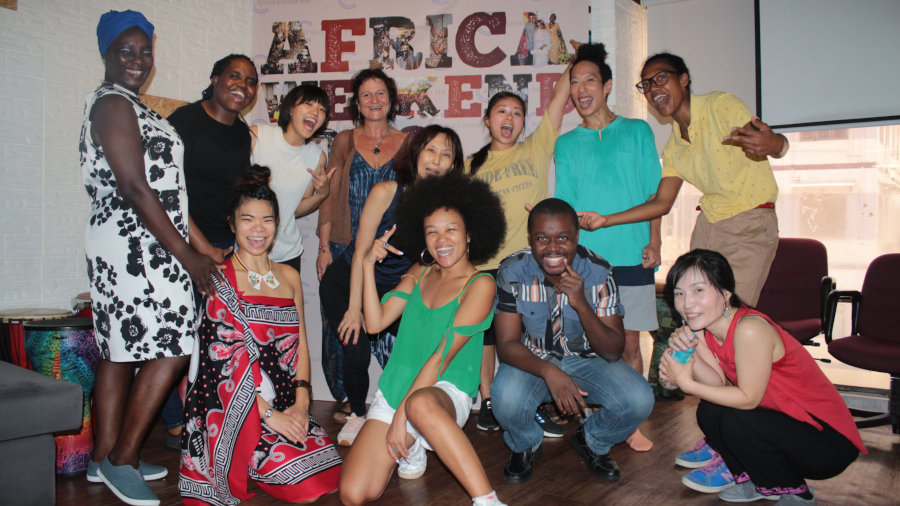
I can answer that in three ways. One, I felt the urgency that it’s time to have something like the Africa Center in Asia. At this particular time, there is a hegemonic shift. For the past 400 or 500 years, the world was dominated by Western perspectives. Now, different voices from different parts of the world matter more. We do see East Asia as a leading region in terms of this influence.
Africans are very resilient people. We have an important voice which was missing and needed.
During this transition when there is a change in the dynamics, what matters, who is the master of the world; this is the time, when it’s a bit more chaotic with changes like COVID. It may be very, very hard to do it at a later point because the world tends to establish itself, it tends to create a new status quo.
We’re saying, “Guys, we’ve got to have an African perspective on the table.” If we don’t advocate for it, the world is going to rewrite the DNA of ideologies and Africa is going to be left out again. We have to fight.
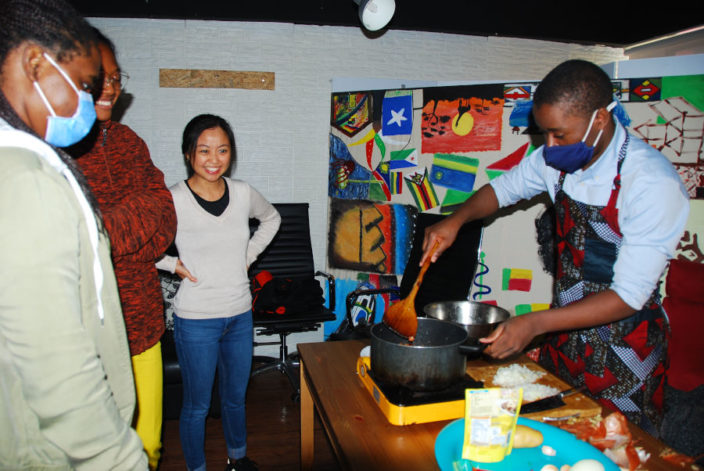
Then, there was a need within the community. People would ask, can you come and teach us how to cook African food? When there was a conversation on gender, they’d ask, what do the Africans actually think? I could see people are actually interested in the African perspective.
With all the uncertainties that have been happening, people realize that the way they’ve been understanding the world is very limited.
When you read the news, you hear thousands of businesses have closed down. That’s the question of resilience, right? Yes, we can blame it on COVID. But what human beings forget is that for the past 200,000 years, uncertainties have actually been the norm. It’s only recently we’ve been able to predict things and now we think we have everything on our hand.
Africans are very resilient people. So I thought, why don’t we bring the people who have developed this perspective of resilience? We have an important voice which was missing and needed in this particular time.
The last way to answer that is I felt inspired by a Nigerian author named Chinua Acebe, one of my favorite ones. He says that until the lion knows how to write, we’ll always praise the hunter. It’s time we take ownership of the African story. If we don’t do it, the story of the Africans will only be told as a single narrative. It’s time to bring that multiplicity of the African voice.
I’m going to have kids in the future. Is this the world I want my kids to grow up in? I said, no, this is not the world I want my kids to grow up in. I’m going to fix those schools so that when I put my kid in there, it’ll be a better school than it was when I got here.
#3 – What impacts have you seen Africa Center have?
We don’t want a world where one culture dominates through propaganda and lies. We can’t be hypocrites. We want to have dialogues with other cultures. It may be an African and Korean kind of dialogue, or an African and Hong Kong kind of dialogue. Dialogue can happen through food, where you have the cuisines mixing together.
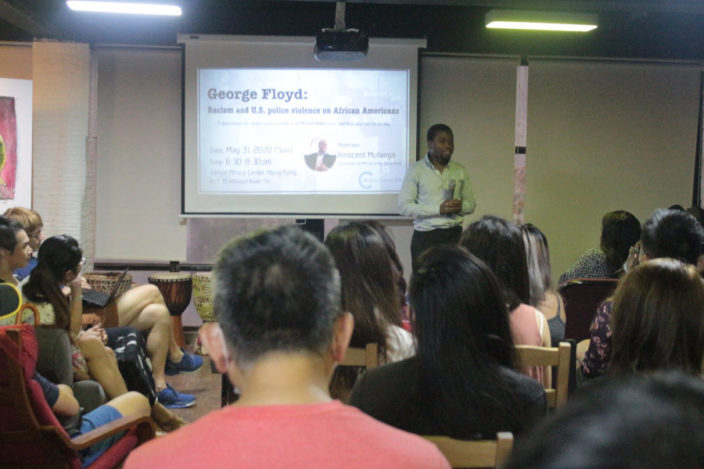
It’s really a better world where people can actually bring in different voices and see things differently. I can see local schools are also opening up more to our programs. Initially it was international schools who really wanted to learn. People send me messages saying, “My son was in your African literature program and now he’s reading an African literature book.” I’m seeing hunger to fill the gaps that that have been left open.
These young people realize they don’t know much about a big part of the world, which is not ideal in any sense.
We just did a program with 100 kids at an international school. On a normal Saturday at the center, you see around 200 people coming in for dinner meetups and arts-related programs, which is great to see.
Sometimes people send me screenshots of them having debates on the internet on race. It may be a newspaper article with an African it, and then people start saying racist stuff in the comments. I don’t have to be the one speaking, I’m seeing Chinese people correcting Chinese people on those platforms. I can identify these people, like, oh, this person comes to our workshops. When I see people calling other people out, I think, my job is done here.
#4 – Do you see positive changes in young people about how they perceive blackness?
The initial perception of blackness in the local Chinese community is that of fear. Blackness is something that’s dangerous. People are a bit more cautious, but they’re still curious. They are scared based on all the misinformation that they’ve picked up from the media, from other people. Those things manifest in different ways, for example getting on the bus and nobody wanting to sit next to you.
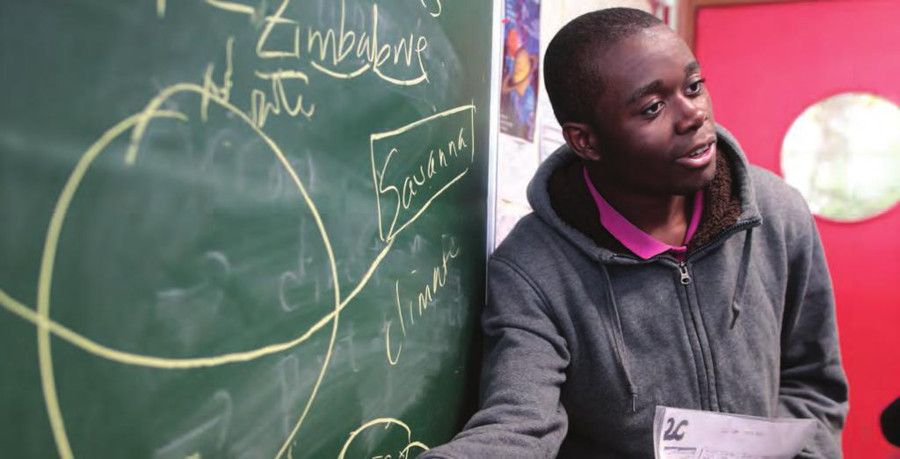
At CUHK, those who were closer to me because they heard me talk in class, or even who had a chance to be closer to me, they all wanted to be with me. They signed up for a course because I was in that class, or went to activities because I was there. The more I was in courses, the more they wanted to do papers on African studies. But those who may not have any close proximity, they wanted to avoid me. The curiosity and awareness was more there with people that were slightly closer to me.
#5 – Can you talk about how you went from homelessness to being the first refugee to graduate from a Hong Kong university?
A good starting characteristic of mine was basically being stubborn. When somebody tells me something cannot happen, my goodness, that’s when I get excited. You said it’s impossible, then that’s a challenge. I like a challenge.
I had to educate people on who I am and what I’m trying to do … and uneducate them on what they imagine I am.
There were certain people in authoritative positions who told me, you’re a refugee, you can’t go to school. That gave me a purpose: prove them wrong.
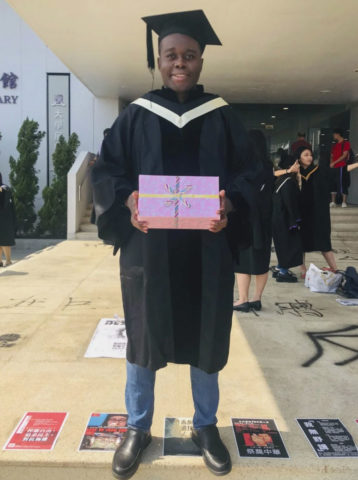
And then just being determined, because once I was in it, there were a lot of obstacles. Some of those were largely due to a knowledge gap in the gatekeepers, people who were supposed to be making decisions.
I had to educate people, not just on their own systems, but also on who I am and what I’m trying to do. And also uneducating them on what they imagine I am. ‘Oh, you are a refugee, are you sure you can write?’ Being a refugee, being homeless, being from Africa doesn’t automatically translate to being illiterate. There were all kind of misperceptions and misconceptions.
So I took that upon myself. I know who I am. But then I had to figure out, how do I stay true to myself and own my story?
I’m aware of how I adjust how I talk to someone based on how they perceive me. It was basically a perception wall at the end of the day. Those were some of the things that I could put in place, and in the end, I was able to get somewhere.
Well, people do very much. The beautiful thing is that I can take any identity I want. Even today, I could go to a certain place as a refugee and people would treat me totally different, not as an equal, and this is largely based on how much money they think I have.
There was a significant change when I started doing university internships in investment banks. I had female friends in school whose parents said, “He just wants to get an HKID, he’s going to take your money,” this and that. But once they heard that this guy is in I-banking, all of a sudden, they all wanted me to come for family dinners. For me as an anthropologist, it was fascinating to see the shift. [Editor’s note: Innocent studied Anthropology at CUHK.]
#7 – What can non-black individuals do in the work of rebranding blackness?
Repackaging the education content for their own communities. No one is better positioned to understand their own community than the person from that community. I can spend hours and hours understanding the anatomy of Hong Kong culture, but there is no way I can understand it to the extent of somebody who was born in it and socialized in it.
I’m hoping 10, 15 years later, there won’t be a link between the Africa Center and the kids educating their own friends on blackness.
What I hope from people is the confidence to take African-related content and actually bring it out to the people that they know. That’s going to mean working with people like the Africa Center or others who are doing similar work.
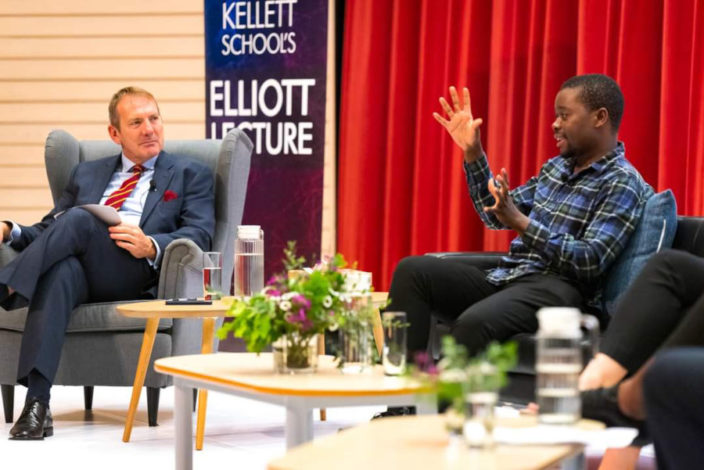
I’m hoping 10, 15 years later, there won’t be a link between the Africa Center and the kids educating their own friends on blackness. That they don’t need my education, they actually can do it by themselves. Even through food! I’m hoping it’d get to a point where somebody can start their own African snack shop somewhere without offending people. Because at this particular point, I know there’s a huge gap in a lot of people understanding us.
#8 – What are the main difficulties that refugees in Hong Kong face?
It depends who you ask. If you ask some refugees, they will tell you the root issue is the lack of right to work. If you can work, then you don’t need other handouts. I’m not going to say, “Oh, we don’t have enough tissue because the government only gives us one per month.” Some people think like that, that their biggest problem is that they don’t have enough tissue, but the main issue is the right to work.
I am absolutely anti-charity or anti-handouts to the refugee community.
Access to education was an issue before, but especially once I started going to university, it started opening up.
But if you ask me what I think is the biggest problem, it’s the knowledge gap. There is misinformation within the community on who they are as refugees. What is the legal status according to the laws? What are the opportunities, what are the potentials, what cannot be done, what can be done? If that misinformation can be cleaned up, I think we’ll have less complaining.
#9 – Can you talk about the work you do to support refugees?
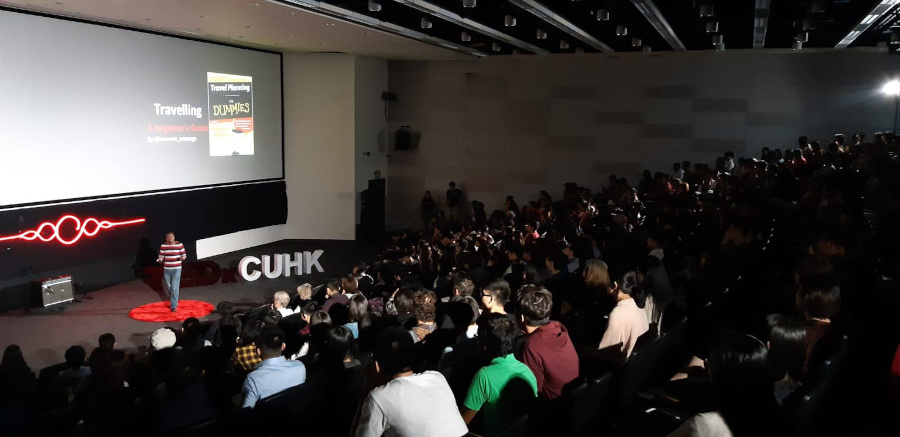
I am absolutely anti-charity or anti-handouts to the refugee community. That’s the worst evil thing anyone could do because it creates dependency.
In a Hong Kong context, the basic things like housing and food are covered by the government, but what’s more important are the things that are more long-term. It’s the same old saying, “Give a person a fish, they’ll keep wanting you to give them fish. But teach them how to fish and they will do their fishing.” I’m more into that, how do we teach people how to fish?
Helping someone who doesn’t take initiative has zero impact. I am very close to the community, so I was there before where you try to help people and realize you are just wasting your resources and emotions. I‘m helping people to go to universities in Hong Kong or study on online universities, and people are getting their degrees. Once they have a degree, we connect with companies outside of Hong Kong because they don’t have a chance to work here legally, and they’re going there to work.
The mistake people make is they say they don’t have rights to work. I’m like, nonsense. This is the reality that’s here. How do we teach people how to survive? How to make sure they are getting a sense of meaning?
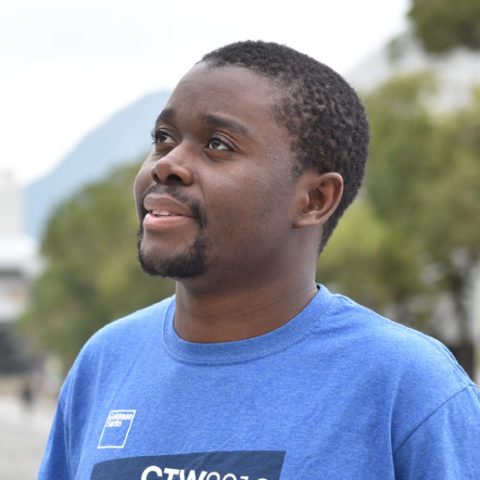
Innocent Mutanga launched the Africa Center Hong Kong at the turn of 2019, which runs cultural programs in Tsim Sha Tsui and DEI programs in schools and companies. Born and raised in Zimbabwe, Innocent fled to Hong Kong in 2013 as a refugee with only HK$200. He eventually went on to study at the Chinese University of Hong Kong where he became the first refugee to get into an official undergraduate program in a local university and further went on to work as an analyst for a major investment bank.
Disclaimer: The opinions expressed in this publication are those of the authors and do not necessarily represent the views of The HK HUB.
Image credits: Africa Center Hong Kong


